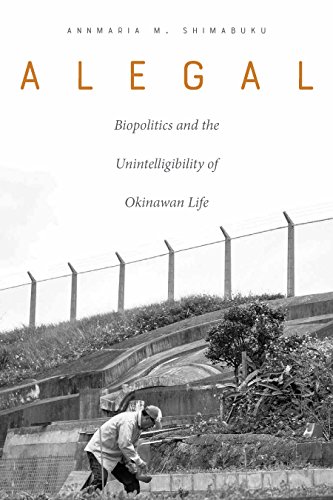Alegal
Biopolitics and the Unintelligibility of Okinawan Life
Annmaria M. Shimabuku
BOOK REVIEW

In Alegal: Biopolitics and the Unintelligibility of Okinawan Life, Annmaria M. Shimabuku deftly navigates the turbulent waters of identity, politics, and existence within the context of Okinawa-a place steeped in both historical strife and cultural richness. 💔 This work is not merely a book; it's a visceral exploration of the lived realities faced by the Okinawan people, presenting a strikingly nuanced analysis that compels you to engage deeply with the complexities of biopolitics and its discontents.
Shimabuku dives into the often-overlooked narratives that define Okinawan life, illuminating how colonial histories and governmental structures shape the identities and experiences of those who call this island home. The author weaves a tapestry of biopolitics, a term suggesting the intersection of life and politics where the sovereign power exerts control over populations, leading us through the political machinations that have rendered Okinawa a site of perpetual struggle. The island's unique sociopolitical landscape-marked by U.S. military presence and historical colonization-becomes a crucible where the intelligibility of life is both contested and reconstructed.
Readers find themselves grappling with the dissonance of not just Okinawan existence, but also the broader implications this has for understanding marginalized lives. Shimabuku crafts her arguments with such emotional intensity that you can't help but feel the weight of each syllable, leading to a profound sense of connection with the people and their stories. As readers, we are forced into an uncomfortable awakening to the injustices faced by those who have often been sidelined in broader narratives.
The book's insights resonate far beyond Okinawa; they echo through the annals of colonial histories everywhere-inviting comparisons to the struggles of Indigenous populations across the globe. The visceral emotions evoked are palpable: anger, sorrow, and ultimately, a fierce resolve to acknowledge and combat such systemic erasure. Yet, Shimabuku does not leave us in despair; she punctuates her narrative with glimmers of hope, resilient voices, and an insistence on dignity.
Readers' responses illustrate this emotional journey vividly, with some feeling deeply compelled by the blend of personal narrative and political exploration-the very heartbeat of Okinawan existence. Conversely, critiques emerge regarding the accessibility of certain theoretical frameworks, with a select few readers stumbling over the dense biopolitical jargon. Still, the overwhelming sentiment emphasizes the need for such works that confront our complacency and challenge us to transcend our ignorance.
The book transcends academic discourse by daring to evoke a sense of urgency, prompting us to confront the implications of biopolitics not just as intellectual exercise but as a pressing ethical responsibility. If you're searching for a text that not only educates but transforms your perspective on identity and resistance, then look no further. The narrative demands your attention, your empathy, and ultimately, your action. 🌊
Shimabuku's exploration of Okinawan life serves as a profound commentary on how biopolitics shapes our very essence, urging you to reflect on your role in the complex tapestry of humanity. Will you join the conversation, or will you remain a passive observer? The choice, as always, is yours.
📖 Alegal: Biopolitics and the Unintelligibility of Okinawan Life
✍ by Annmaria M. Shimabuku
🧾 224 pages
2018
#alegal #biopolitics #unintelligibility #okinawan #life #annmaria #shimabuku #AnnmariaMShimabuku